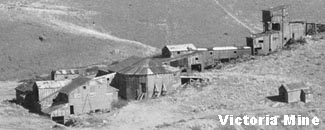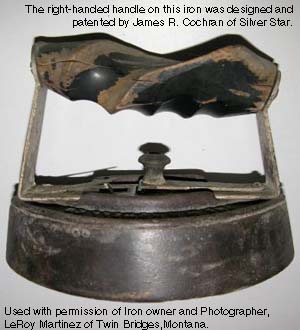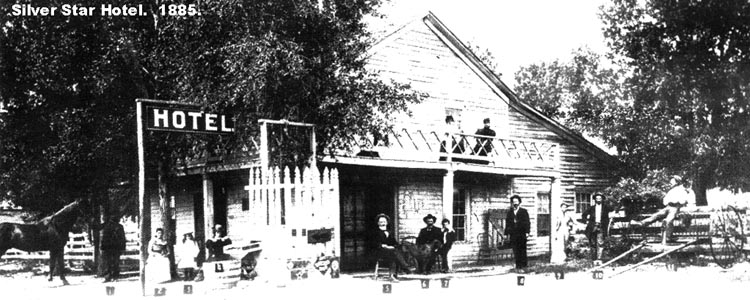Granny's Country Store | Browse our Books! | About Silver Star | Local Links | Search | View Cart

A Brief History of Silver Star, Montana
Silver Star is the third oldest town in Montana, a story which began in 1866 when a prospector named Greene Campbell discovered gold on the side of a hill about 1 1/2 miles west of the present town site. He filed a mining claim under his name, and the "Greene Campbell" became No. 1 in the book of Montana patent records. Mr. Campbell employed several men on the property, including Richard Pascoe, John Eads, Joseph Barkell, and William Gilbert, with Charles D. Everett in charge if operations.
In 1867 Mr. and Mrs. Joseph Barkell, with their two boys, Richard and James, moved from their homestead on the Beaverhead River, where for two years their crops were destroyed by grasshoppers, to Cherry Creek about one-half mile from the present site of Silver Star. At the time, there were no houses on the present site of Silver Star, but the news that "there was gold in the hills " brought in prospectors, miners, and a few more families within the next few years.
 Sometime between 1867 and 1869 the first log cabin was built on the present site of Silver Star. In 1868 Mr. and Mrs. Benedict Weingart and son, Albert, located near the present site of Silver Star. A post office was established on June 15th, 1869, and John Conner was appointed the first postmaster.
Sometime between 1867 and 1869 the first log cabin was built on the present site of Silver Star. In 1868 Mr. and Mrs. Benedict Weingart and son, Albert, located near the present site of Silver Star. A post office was established on June 15th, 1869, and John Conner was appointed the first postmaster.
George R. and Amy L. Noyes settled here in 1869, but Amy died on March 22nd of that year. She became the first person buried in the Silver Star cemetery on the hill over-looking town. Other early settlers included Charley Hineman, Billy Horner, George Brown and Jim Slavin.
Many of the early settlers were transient prospectors looking for gold. Some built cabins on the site of Silver Star to be near the waters of Cherry Creek and the Jefferson River. They traveled up into the hills by day to prospect and came back to town to camp at night. Early mines included the Iron Rod, started by Dahler and Eargey, the Broadway and the Hudson started by a Mr. Taylor, the Owsley mine, started by John Stock, and the Aurora Borealis, started by Charley Hineman. The various mines were said to have produced hundreds of thousands of dollars worth of gold, with the Broadway alone producing more than $1 million.
A stamp mill was built on the bank of the Jefferson River in Silver Star by Charles D. Everett to help process the gold ore, and the remains of the stonework are still visible today. Three arrastras were also built and operated in the area. There were hundreds of men working in the mines and in the hills, with an estimated 2,000 people living among several mining camps in the area. A general merchandise store was opened by Smith and Greater out of Bannack in one of the larger mining camps
Two brothers, George and Bill Boyer, had a mining claim called the Silver Star in one of the canyons east of the Jefferson River, in the Tobacco Root Mountains. These men and other prospectors working in the hills, would get together in the general merchandise store on Saturday nights. There had been some controversy as to what to name two main mining camps, until at one meeting the men decided to pick some names. One of the Boyer brothers said, "We'll call this 'Silver Star' and the other 'Rag Town', and the names stuck.
A two-story log building owned by a Mr. Osler served as a drug store downstairs and as the Masonic Hall upstairs. There was also a butcher shop, hotel, seven saloons, stores, blacksmith shops, and a livery stable. There was work for those who wanted it, and a grubstake for the prospectors by the stores.
The Silver Star Hotel was built by A.J. Noyes in about 1867, just across the street from today's Granny's Country Store. In the winter of 1878, Prince Edward of Wales, son of Queen Victoria, stayed at the hotel for three days. He was coming from a tour of western Canada, with a party of six people in light wagons. They were hunting game and grouse along the way. The Prince was apparently en route to Salt Lake City to take the train back east, when a winter storm held him up in Silver Star. He was reportedly friendly and well-liked.
 It didn't take long to work through the rich, oxidized surface ore, until all that was left was the lower grade sulfide ore. The deeper mines had a higher mining cost, and some had to pump water out to keep working. The Broadway Gold Mining Company (Limited) of London had reportedly invested $500,000 into their Silver Star operation to work refractory ore, but by 1884 the mine closed and the tramway, hoisting works, lumber, scales, blacksmith and mining tools were all sold off to the highest bidders at a sheriff's sale.
It didn't take long to work through the rich, oxidized surface ore, until all that was left was the lower grade sulfide ore. The deeper mines had a higher mining cost, and some had to pump water out to keep working. The Broadway Gold Mining Company (Limited) of London had reportedly invested $500,000 into their Silver Star operation to work refractory ore, but by 1884 the mine closed and the tramway, hoisting works, lumber, scales, blacksmith and mining tools were all sold off to the highest bidders at a sheriff's sale.
Most of the larger producers were gone in a few years, but the remaining small operators kept Silver Star on the map, with active gold mining continuing through the remainder of the 1800's and a large part of the 1900's.
In 1891, James Rollen Cochran of Indiana came to Silver Star. He worked first as a stage driver, and then got into mining. He later became a clerk at the general merchandise store, working for Mr. George C. Blackman, and bought the business a year later. He was appointed Postmaster of Silver Star in 1894. He married Blackman's sister Adelaide Beryl Blackman that year, and they had one daughter, Hazel Eunice Cochran, born August 24, 1896.
James Cochran applied for two patents, one for an iron handle, called the "Glad Hand" and the other for a special rack on which to rest an iron. Cochran had his inventions manufactured in Indiana, and made a profit from them. He was influential in initiating construction of the first bridge spanning the Jefferson River at Silver Star. The Cochrans moved to Bozeman in 1914, then retired to Longbeach, California in 1925. James died there in 1935, and Adelaide died in 1952.
